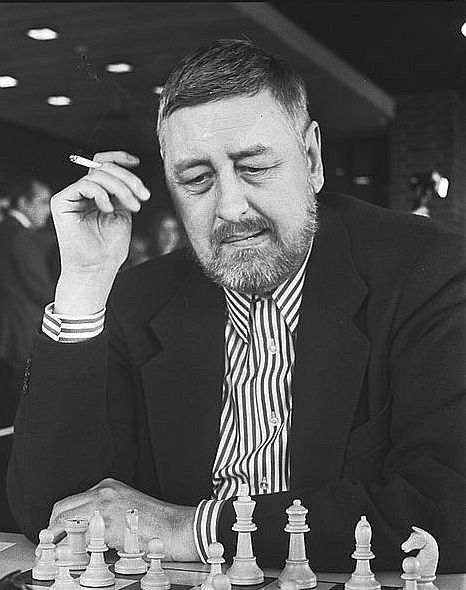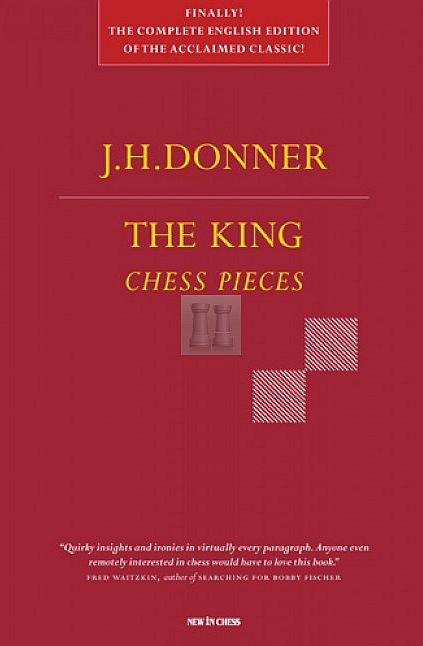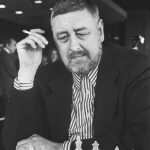Ik bewonder wijlen Jan Hein Donner (1927-1988) meer om zijn geschriften dan om zijn schaken, hoewel hij drie keer Nederlands kampioen werd (in 1954, 1957 en 1958) en enig internationaal succes had (in Beverwijk 1963 eerst, vóór Bronstein, en in Venetië 1967 eerst, vóór Petrosian).

Op 24 augustus 1983 kreeg Donner een hersenbloeding die zijn spelerscarrière op 56-jarige leeftijd beëindigde (“Net op tijd, want op 56-jarige leeftijd kun je niet zo goed schaken als op 26-jarige leeftijd“, zei hij sardonisch). Hij stierf op 27 november 1988 op 61-jarige leeftijd. Zijn vrienden Tim Krabbé en Max Pam verzamelden zijn beste geschriften in één boek: “De koning: schaakstukken“. Dat is een boek dat ik iedereen kan aanraden, en ik ben niet de enige die er zo over denkt.
De Koning
Jeremy Silman begint zijn recensie van “The King” als volgt: “Ik heb lang geklaagd over het gebrek aan goed schrijven in schaakkringen. In feite doet de meeste schaakonzin die voor proza doorgaat me denken aan een Republikeinse lezing over familiewaarden: dwaas, saai, voor de hand liggend, oppervlakkig en altijd (pas op! dit is het deel dat me echt beledigt!) politiek correct. Toen verscheen er een licht aan het einde van de tunnel: een razende Nederlandse gek genaamd Donner!“
En dit is wat de uitgever zegt: “Dit is het meest buitensporige schaakboek dat voor geld te koop is! Nederlandse lezers volgen het schrijven van de legendarische, overleden J.H. Donner al tientallen jaren. Geestig, eigenwijs, soms chagrijnig, hij was nooit saai – altijd leuk om te lezen. Hier is een verzameling van zijn beste essays, vertaald in het Engels. We noemen het het schaakboek van de eeuw. Beperkte oplage.“

Harry Mulisch
Jan Hein Donner en Harry Mulisch waren goede vrienden. Hun vriendschap speelt een grote rol in Mulisch’ magnum opus “De ontdekking van de hemel“. In de twee hoofdpersonen, Max Delius en Onno Quist, herkent de lezer veel van Harry Mulisch (Max) en Jan Hein Donner (Onno).
Enkele gegevens en feiten van Donner
Johannes Hendrikus (Jan Hein) Donner werd geboren op 6 juli 1927 in Den Haag (trouwens: Adolph Anderssen werd ook geboren op 6 juli!). Hij leerde schaken op 22 augustus 1941. Deze exacte datum werd onthouden omdat het dezelfde dag was dat zijn vader gevangen werd genomen door de Duitsers (het was de Tweede Wereldoorlog). Hij had een bijzonder talent voor schaken, want een jaar later speelde hij tegen Euwe. In 1944 trad hij toe tot DD (Discendo Discimus). Hij was zijn hele leven lid van deze beroemde Nederlandse schaakclub. In 1945 begon hij zijn rechtenstudie aan de Universiteit van Amsterdam, maar bracht daar het grootste deel van zijn tijd door met schaken. Hij verwierf internationale bekendheid in het Hoogovenstoernooi van 1950. Hij behaalde de eerste plaats voor Euwe en Rossolimo. In 1952 werd hij IM en in 1959 IGM. In 1954 wordt hij Nederlands Kampioen en maakt daarmee een einde aan de 33-jarige (!) heerschappij van Euwe. Toen hem werd gevraagd om zijn beste spel te noemen, zei hij: “…er is heel weinig over van de honderden partijen die ik heb gespeeld. Misschien één. Een korte, maar wel een die een deel van de perfectie laat zien waar ik altijd naar op zoek was, maar die ik bijna nooit vond. …” Dit is die partij:
Donner Quotes
- “Het Nieuwe Testament is de enige detective die overduidelijk de lezer als schuldige aanwijst.”
- “Nadat ik deze partij met perfecte zelfbeheersing had opgegeven en mijn tegenstander plechtig de hand had geschud in de beste Angelsaksische tradities, haastte ik me naar huis, waar ik mezelf huilend en schreeuwend op mijn bed wierp en de dekens over mijn gezicht trok. Drie dagen en drie nachten zaten de Erinnen achter me aan. Toen stond ik op, kleedde me aan, kuste mijn vrouw en dacht na over mijn situatie.”
- “Liefde is: je hele leven proberen je vrouw te leren schaken.”
- “Hoe pijnlijk het ook is, we mogen niet terugdeinzen voor de waarheid: vrouwen kunnen niet schaken.”
- “Een geur van heiligheid begon zich door de toernooizaal te verspreiden en ook buiten, tot aan de hoogovens die rook in de verte spuwden. Een paar gereformeerde broeders, die er terecht van uitgingen dat het MYSTERIUM TREMENDUM1 toen en daar in mij aanwezig was, verzamelden zich om me heen en vroeg me of dit overweldigende teken van genade geen teken voor mij was om terug te keren naar de dienst van de Heer der Heerscharen. Hij, van wie we alleen omzichtig kunnen spreken, is mijn vriend, de helper, door wie ik over een muur spring.” (over het redden van een overwinning uit een verloren positie).
- “Een echt schaakspel kan alleen door twee personen worden beleefd.”
- “Ons spel is gewoon te moeilijk voor gewone intelligente mensen.”
- “De schaker die zijn spel heeft verloren – wie zal hem beschrijven? Ik heb gezien dat hij zich niet kon bewegen. Het publiek was al lang weg, de lichten waren uit en nog steeds zat hij stijf in zijn stoel te staren naar het lege bord, want hij had Bg2 over het hoofd gezien. Een geval van volledige verstening, met omstanders die fluisterden en op hun tenen voorbijliepen. Ik heb hem in godslasterlijke taal om straf horen smeken. Hij was Nh5 vergeten en in zijn ontzetting riep hij de vernietiging over zichzelf af. Spottend verwierp hij onze woorden van troost, eiste beledigingen en tuchtigingen. Van veraf staand en met afschuw vervuld, heb ik gezien hoe hij in orgiastische woede vloekte om zijn geslachtsdeel af te rukken, omdat hij Df6 had gespeeld in plaats van Db6.”
- “Hij speelt een afschuwelijk krom schaakspel. Als correct spel en beoordelingsvermogen zouden tellen, zou hij nooit een partij winnen. Hij heeft geen idee. Hij is de slechtste speler van de hele wereld.” (over Lodewijk Prins).
- “Prins was in zijn element. Volslagen onzin bleek een groot succes. Het is triest dat een speler van zijn niveau officieel als de sterkste van Nederland moet worden aangemerkt.” (over Lodewijk Prins die het Nederlands kampioenschap schaken wint).
- “Als ik hun hoofden niet meer tegen elkaar kan slaan, is het tijd voor mij om te gaan.”
- “Mijn zaak is nu eenmaal minder schrijnend dan het zou zijn geweest als ik totaal afhankelijk was geweest van de Nederlandse schaakwereld, maar niet iedereen krijgt de kans om met een rijke vrouw te trouwen.” (nogal sarcastisch, aangezien zijn vrouw zeker niet rijk was).
- “Mannen willen je in elkaar slaan, maar vrouwen willen voor je zorgen. Persoonlijk heb ik liever een pak slaag, want daar komt een eind aan.”
- “Wat is dit? Ben je de arme jongen aan het schaken aan het leren? Fie, wat een schande! Waarom laat je hem geen sterke drank drinken of hem meenemen naar een bordeel, nu je toch bezig bent?” (over een kind leren schaken).
- “Er is een overtuiging, diepgeworteld in Nederland, dat geen enkele Nederlander ooit iets van waarde kan bereiken. Euwe was zo overstuur toen hij wereldkampioen werd dat hij de titel zo snel mogelijk kwijt was.”
- “Vriendelijk, vol beloften en garanties voor de wedstrijd, maar blanco geheugenverlies achteraf. Zo zijn deze heren.” (over Nederlandse toernooiorganisatoren).
- “Hij heeft me waarschijnlijk helemaal niet over het hoofd gezien. Nee, hij heeft me expres weggelaten. Sterker nog, ik heb sterk de indruk dat hij alleen maar zijn mening heeft gegeven om mij niet te noemen! Hoe durft hij, de kleine snotaap !” (omdat hij werd weggelaten uit Fischer’s lijst van de 10 beste schakers aller tijden).
- “Ik hou van alle posities. Geef me een moeilijk positioneel spel, ik speel het. Geef me een slechte stelling, ik verdedig het. Openingen, eindspelen, ingewikkelde stellingen, saaie remises, ik hou ervan en ik zal mijn uiterste best doen. Maar totaal gewonnen posities, ik kan ze niet uitstaan.”
- “Hij heeft een paar beruchte remise varianten bijgedragen aan de schaaktheorie en is er duidelijk van overtuigd dat winnen of verliezen een abnormaal einde van een schaakspel is.” (op Trifunovic).
- “De stortvloed aan onbeschoftheid, meisjesachtig mokken (‘Ik spreek niet meer met je’) en regelrechte beledigingen die ik moet verdragen van jongeren die mij nog niet kunnen overtreffen op het schaakbord, kan een psychologische verklaring hebben. Ik vind de intensiteit van hun agressie soms nog steeds angstaanjagend. Als Böhm gebruik maakt van de publiciteit rond zijn uitstekende resultaat in het recente IBM-toernooi om zijn twijfels over mijn seksuele bekwaamheid te uiten en dan triomfantelijk verklaart dat hij zijn ‘wraak’ heeft genomen, dan begrijp ik niet helemaal waarom, hoewel ik vermoed dat het om problemen gaat die hij voor zichzelf zal moeten uitvechten.”
- “Hoe kan een westerse grootmeester verliezen van een Chinees?” (na zijn verlies tegen Liu Wenzhe in Buenos Aires, 1978). Dit is die partij:
- “Zelfs in de schaakwereld is er minstens één vrouw die scoort als een speler van wereldklasse. Voor verstokte masculienisten en voor degenen die grappige stukken moeten schrijven om de kost te verdienen, is dit een serieuze tegenvaller, die ons natuurlijk niet zal beletten onze strijd onverminderd voort te zetten.” (sprekend over Nona Gaprindashvili).
- “Vrouwen kunnen alles, maar ze kunnen niet logisch denken. Ze hebben geen intuïtie.”
- “Grote schrijvers moeten dood zijn. Dat ze leven is niet goed voor ons. Integendeel, omdat ze leven, is er iets onvoltooids aan hun werk. … ze kunnen van gedachten veranderen of verdere uitleg geven, waardoor hun werk verpest wordt .”
1 De term mysterium tremendum werd door de Duitse theoloog en filosoof Rudolf Otto in zijn boek Das Heilige (The Idea of the Holy; 1917) gebruikt als beschrijving voor “spirituele of religieuze emotie opwekken; mysterieus of ontzagwekkend”. Otto’s concept van het numineuze (een andere term die hij gebruikte voor mysterium tremendum) beïnvloedde denkers als Carl Jung en C.S. Lewis. Het is toegepast op theologie, psychologie en beschrijvingen van psychedelische ervaringen.
